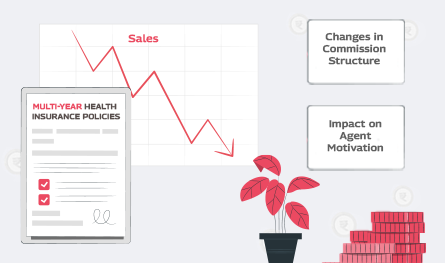The new standards in commission structures have reduced agent interest in promoting long-term health policies, thus driving them toward short-term policies. The policyholder marketplace will likely experience less promotion of multi-year plans, even though these plans provide valuable benefits. The assessment of health insurance developments requires a thorough analysis of the reasons behind policy sale decline and their consequent impact on policyholders, insurers, and insurance agents.
Multi-Year Health Insurance Policies - The Reasons Behind Its Popularity
Policyholders have traditionally opted for multi-year health insurance as these policies provide several desirable benefits.
- Protection Against Rising Premiums: Health insurance premiums undergo regular price surges. Multi-year health insurance policies enable policyholders to secure their premium costs at set rates across multiple years, thus protecting them from financial uncertainty.
- Convenience: Insurance policy renewals are generally initiated annually. This aspect proves to be inconvenient for many users. Insurance policyholders who select multi-year plans receive uninterrupted coverage as they do not need to renew their policies yearly.
- Discounts and Savings: Long-term insurance policies from insurers are available at discounted rates that surpass the yearly renewal costs for one-year policies.
These advantages have not prevented the market from experiencing decreased sales of multi-year policies.
The Impact of IRDAI’s New Commission Rules
The revised commission guidelines from IRDAI influenced multi-year health insurance sales to decrease as the compensation process of insurance agents altered.
A. Changes in Commission Structure
Before the new regulations, agents received full commission payment [in lump sum] during the sale of a policy. Agents received better financial rewards when they promoted policies with extended terms. According to the updated rules, commission payments are distributed across the entire policy duration [installment compensation]. Thus, according to the new policy structure, insurance agents will receive instalment payments.
B. Impact on Agent Motivation
Insurance agents function as critical influencers who shape the customer decisions. The new commission structure has cut down their short-term earnings. Therefore, agents primarily focus on annual policy sales, which provides complete commission payments during each yearly renewal.
Implications for Policyholders
A. Fewer Multi-Year Policy Offerings
Presently, the agents focus on single-year plans, which leads to reduced promotion of multi-year insurance policies. Health insurance policyholders have limited access to all available options when searching for coverage.
B. Increased Long-Term Costs
People who use short-term policies do not face problems from this change in policy promotion. However, the long-term financial effects will show a substantial impact. The premium costs for annual policies increase yearly, but multi-year policies maintain consistent pricing structures.
C. Lack of Awareness Among Consumers
Most people need insurance agents to help them select their insurance coverage. Customers may fail to learn about the fundamentals of multi-year policies as agents refrain from recommending them. Therefore, customers remain unaware about these plans and their advantages.
How Insurers Are Responding
Insurance providers are in search of adequate methods to adjust their operations according to this evolving market. Some strategies being considered include:
- Insurance companies must modify their commission systems to motivate agents to distribute multi-year insurance plans.
- The insurance industry should improve its online direct customer sales while cutting back on agent-driven sales channels.
- Insurers provide extra value and perks to enhance multi-year policies, even though agent commission rates have decreased.
Insurers must find an equilibrium between rewarding agents and selling policies that benefit customers to maintain multi-year policies as a substantial market option.
.jpg)









.png)
